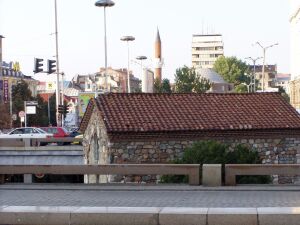History - a short overview
Once, Bulgaria was part of the vast →Kingdom of Macedonia and after that a province of the Roman Empire. First Slavic tribes arrived during the 6th century. Among them were the Proto-Bulgarians, coming from middle Asia. The leader of the latter, Khan Asparoukh, founded the First Bulgarian Empire in 681. The capital of the empire, which existed until the year 1018, was →Pliska. During that time, the Proto-Bulgarians, originally a Turk tribe, were culturally assimilated by Slavic tribes.
Tsar Boris I., one of the emperors of the First Empire, managed to unify and chrisitianize the nation. During the reign of one of his successors, Tsar Simeon, the Bulgarian Empire reached its biggest extent - it occupied almost all of the Balkan. After Tsar Simeons death, the Empire gradually declined. Preslav, at that time capital of Bulgaria, was conquered by the Byzantine Empire. Therefore, the capital was shifted to →Ohrid in present-day Macedonia. In 1018, the Byzantine Empire controlled the entire empire. Two brothers, Asen and Peter, led a successful uprising against the occupants in 1185. Only one year later, they founded the Second Bulgarian Empire with →Veliko Tarnovo as the new, shining capital.

| ||
| Multifarious Bulgaria: Mosques, Churches and more |
This second Bulgarian heyday was over in 1396. The Ottomans had already crushed the Byzantine Empire, and Bulgaria was next. The Ottomans conquered the entire country and started settling in the area. Only a few monasteries, such as →Rila, could guarantee the Bulgarian cultural identity. During the very long occupation, some Bulgarians converted to Islam. The so-called Pomaks, muslim Bulgarians, can still be found here and there in Bulgaria and north-west →Turkey.
The situation shouldn't change during the following centuries. Bulgaria remained an Ottoman province. The Bulgarian culture and its symbols gradually perished. Countless churches and monasteries were destroyed systematically. In 1876, Bulgarians initiated the Koprivshtitsa uprising, but this was brutally put down by the Ottoman rulers. However, the rest of Europe had heard about the uprising and living conditions in Bulgaria, and so Russia declared war on the Ottomans. Bloody fights erupted in Pleven and around the Shipka Pass, leaving around 200,000 Russians and Bulgarians dead (the number of Ottoman victims is not known). Eventually, Russia managed to push the Ottomans out of the country. The Treaty of San Stefano gave way to an independent Bulgaria, covering a large part of the Balkan peninsula. But the treaty was revised in the Congress of Berlin in the same year. As a result, South Bulgaria aka East Rumelia, parts of present-day Greece and Macedonia became parts of the Ottoman Empire again.
In 1879, the first National Assembly took place and agreed on a constitution. The ruler was to be a German monarch. However, Bulgaria couldn't declare full independence before 1908. Shortly after that, Bulgaria, together with Serbia and Greece, started the First Balkan War to drive the Ottomans out of Europe. Less successful for Bulgaria was the Second Balkan War, which broke out between the former alliance a few years later. Bulgaria lost the war and as a result, it had lost present-day →Macedonia. After the war, chaos reigned. During the Second World War, Bulgaria formed an Alliance with Nazi Germany, but its leaders refused to hand over the Jewish minority. At the same time, the communists grew stronger. At the end of the war, the country even suffered massive air strikes by the Allies.
In September 1944, the Red Army occupied the country, and the Bulgarian Fatherland Front gained power. Communist rule, backed by the Soviets, followed. Georgi Dimitrov became the first president. He was followed by Todor Shivkov in 1962. Not much had changed then until the year 1989, when an internal party coup swept away Shivkov. The Communist party started some reforms but remained in power. During the 1990ies, the government changed a couple of times, and chaos broke out. The country gradually declined. Political unrests, the occupation of the parliament by demonstrators, hyper inflation, mass dismissals etc severely destabilised the country. But things got better now. In 2001, king Simeon II (king of Saxonia-Coburg-Gotha, Germany) was elected (!) president. He returned from his exile to rule the country, but after a short while he found himself in trouble as well (as of 2003, check for recent news).
Nowadays, the country has a serious population problem. The growth rate has been negative for a couple of years already. And it's not -0.2% or so but -1 %, which is, if continuing like this, desastrous. The netto migration rate is -4.5 per 1,000 inhabitants, which is another serious problem. 1/8 of the Bulgarians are living at or below poverty line (much less than years before), but unemployment rate is around 18 %. In 2004, Bulgaria joined the NATO, and additionally the country is trying hard to gain full membership of the EU.
©2024 Europe-East.com

 Albania
Albania Bulgaria
Bulgaria